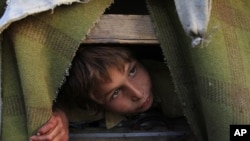The United Nations says peace and stability will not be achieved in south Asia until durable solutions are found for millions of Afghan refugees. Delegates from more than 40 countries, including Afghanistan, Pakistan and Iran are discussing the Afghan situation at a two-day conference in Geneva.
Afghanistan has been producing refugees for more than 30 years, and the endless wars in that country continue to create new refugees and internally displaced people.
The U.N. refugee agency, which is co-hosting a two-day conference in Geneva, calls this one of the most complex and protracted refugee situations in the world.
The conference is seeking solutions for the three million Afghan refugees living in Pakistan and Iran, and 5.7 million Afghans who have returned to their country after many years in exile.
U.N. High Commissioner for Refugees Antonio Guterres says displacement in Afghanistan and beyond its borders continues because of instability, drought and unfavorable conditions. He says the rate of return has declined during the past three years, from a high of more than one-quarter of a million refugees per year to about 70,000 last year.l
“We are in an important period of transition in Afghanistan that is characterized by uncertainty," said Guterres. "Afghan refugees have shown that they “vote with their feet” when conditions for return are conducive, they have always wished to go home. Durable solutions for refugees and creating conditions for sustainable return and reintegration do not lie within the scope of humanitarian action alone. It requires political and economic developments.”
One year ago, the UNHCR along with the governments of Afghanistan, Iran and Pakistan began to map out a three-year strategy aimed at creating opportunities for sustainable solutions for Afghan refugees.
Ambassador Lakhdar Brahimi has served twice in Afghanistan as Special Envoy of the UN Secretary-General, from July 1997 to October 1999 and immediately after 9/11, 2001 until January 2004.
In his keynote address to the conference, he urged the international community to learn from the mistakes of the past and not to repeat them. Brahimi says time and again nations have pledged not to forget Afghanistan and to remain engaged, only to abandon the country, resulting in more conflict, more deaths, and more refugees.
“Of course, interest for Afghanistan immediately jumped up sky-high after 9/11," said Brahimi. "9/11 is the direct consequence of the way in which the international community turned its back on Afghanistan after the Soviet Union withdrew from that country in 1989. Are you going to turn your back again on Afghanistan?”
Brahimi says political negotiations must include all segments of Afghan society, including those Taliban who are ready to join the process. He says such negotiations should mobilize the support of all Afghanistan’s neighbors, including Pakistan and Iran.
He says a political settlement would put an end to the fighting and create a better future for the millions of refugees and displaced people who, through no fault of their own, have been stripped of their homes and their rights.




